World reacts to Australian war crime inquiry report
Australia’s intelligence agencies fear reports of alleged war crimes will be used by enemies including terror groups as the army’s acts stun Allied Forces.
World
Don't miss out on the headlines from World. Followed categories will be added to My News.
Revelations Australian Special Forces allegedly committed war crimes, including 39 murders and unlawful killings in Afghanistan, are reverberating around the globe, just as Australia’s intelligence agencies had feared.
Major Qatari news outlet Al Jazeera reported the findings of the Brereton inquiry in detail, including by publishing a story quoting a man named Haji Abdul Baqi, who claimed his brothers Saifullah and Bismillah, and two of his cousins, Mohammadullah and Juma Khan, were killed in raids by Australian soldiers.
The unverified claims — not detailed in the version of the Brereton inquiry made public and not reported publicly before — include grim allegations that soldiers had burned down public buildings and set their dogs to attack people before shooting them dead.
Australia’s intelligence agencies are concerned public revelations of the alleged atrocities will be used by enemies of Australia including terror groups for recruitment and propaganda, and will raise the risk of an attack against Australia on home soil or overseas.
Government and military strategists also fear it will be used to undermine Australia’s military actions in the Middle East, and damage Australia’s international reputation.
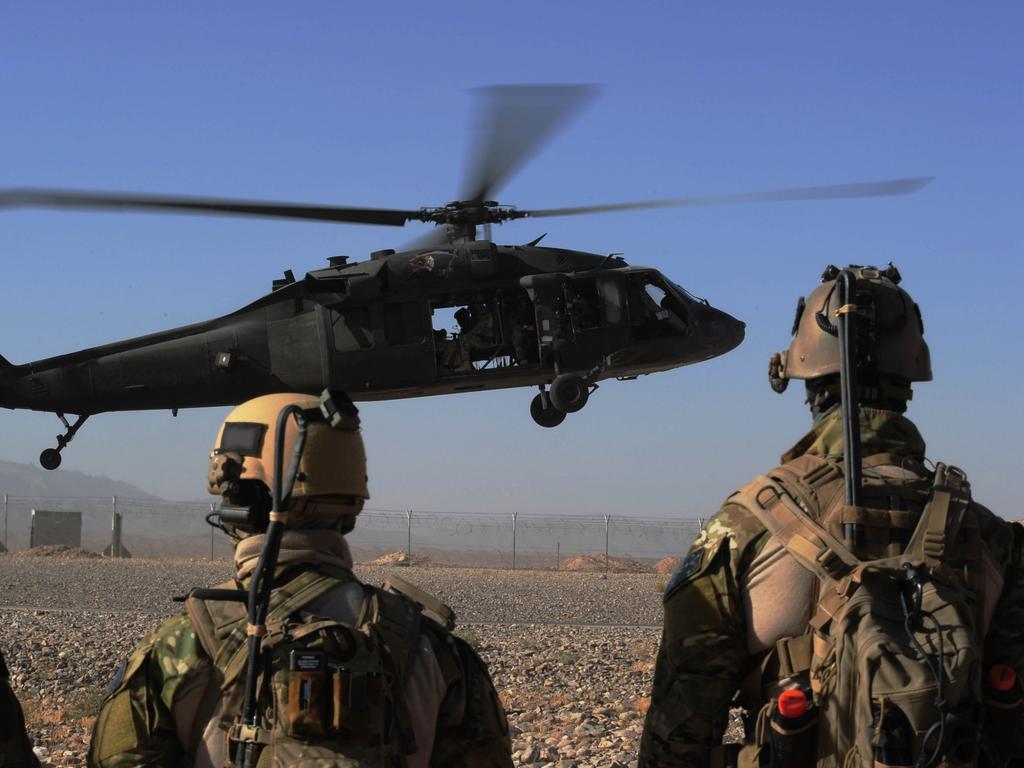
Chief of the Defence Force General Angus Campbell confirmed the concerns as he released the report on Thursday, saying Australia needed to be “alert”.
“I don’t want to myself be part of the amplification in what I offer to you but clearly what has happened, and the need and the appropriate necessity of seeing this made public, does potentially create fuel,’’ he said.
“It is a truth, or at least an allegation of a truth, that we must face up to and, hence, we need to be alert and just be aware of our circumstances, depending on where people are in the world.’’
Prime Minister Scott Morrison said the Government had taken “all the necessary precautions” to avoid being targeted by other countries or extremists before the report was released.
“Look, there are always risks out there and it’s always important that Australia stays on the front foot to get ahead of those risks,” he said.
“And I can assure you that in our handling of this report that those types of issues were carefully considered and preparations as necessary were taken.”
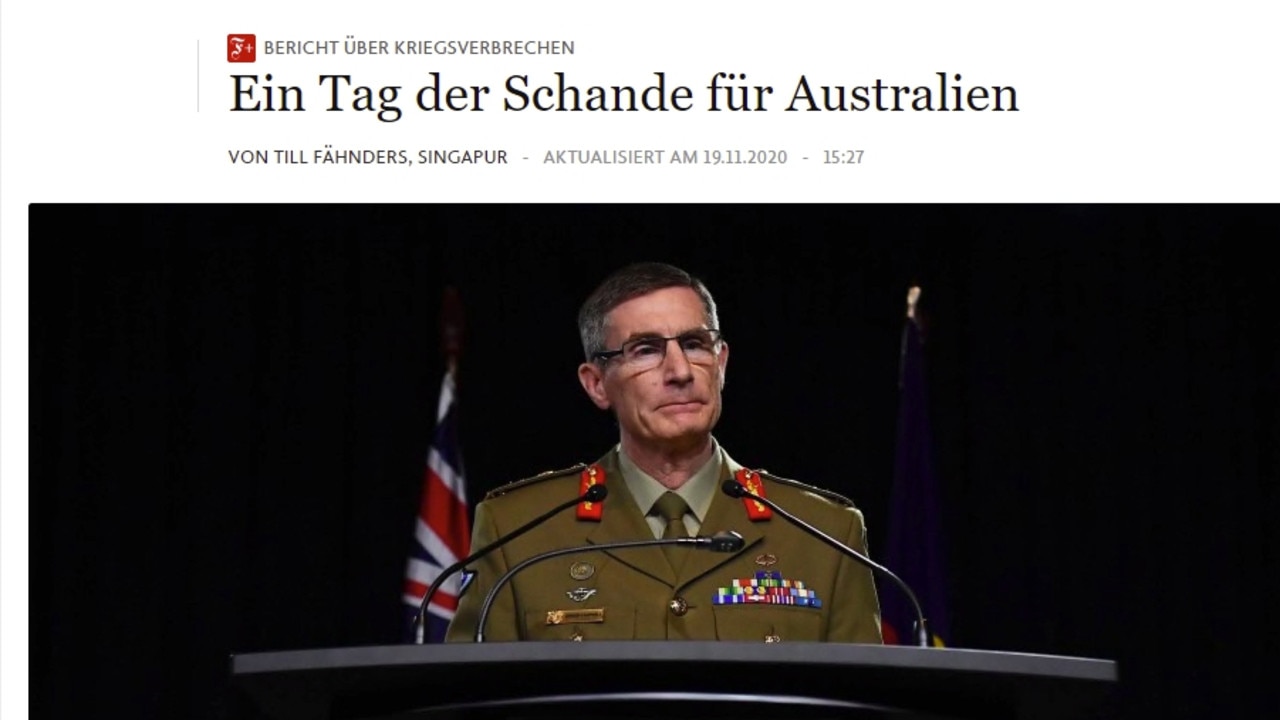
In Afghanistan, the independent Human Rights Commission said Australians had “brutalised’’ Afghans, including children, and it deplored the “deliberate inhumane acts of violence”.
The Associated Press reported the incident globally, including details of “blooding,” saying “new patrol members would shoot a prisoner to achieve their first kill.”
In Germany, the right-leaning Frankfurt Allgemeine Zeitung headlined the story: Day of shame for Australia.
The Straits Times in Singapore described the report as “shame and vindication,’’ while China’s Global Times, closely aligned to the Chinese Communist Party, ran Agence France Presse’s wire story, accompanied by a photograph of Prime Minister Scott Morrison alongside US President Donald Trump.
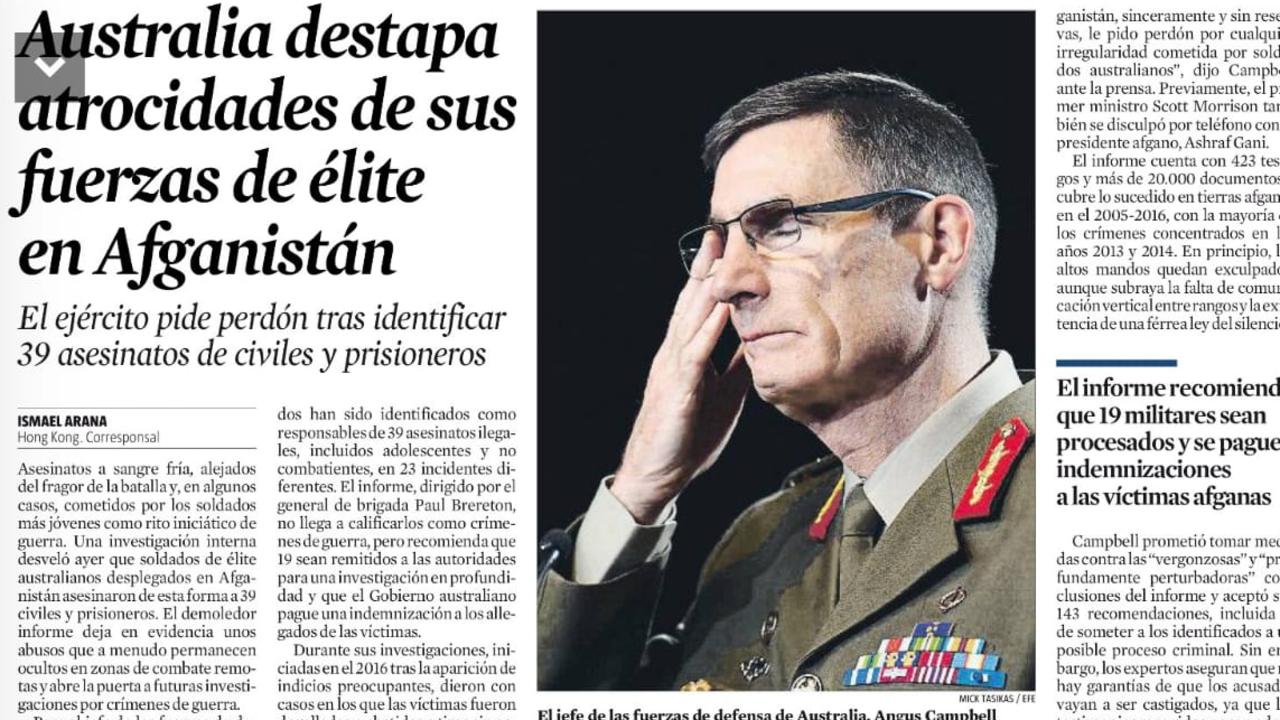
CNN in the United States, the Times of London, The Guardian UK and the Daily Sabah in Turkey all covered the story in detail.
In Dubai, the English-language Khaleej Times reported the revelations and described them as “harrowing”.
The largest selling newspaper in France, Ouest France, said authorities had tried to keep the “dust under the carpet’’ and reported police raids on the ABC for its reporting on the crimes, as well as intimidation of whistleblowers.
Le Parisien opened its story with a focus on General Campbell: “His face tense, his tone calm. Australia’s top military official on Thursday admitted the existence of credible evidence showing that his special forces ‘unlawfully killed’ at least 39 Afghan civilians and prisoners.’’
In Spain, La Vanguardia newspaper ran a lead story and photographer of General Campbell, under the headline: ‘Australia highlights atrocities of its elite forces in Afghanistan’.
AUSSIES JOIN INFAMOUS LIST
Australia’s armed forces may have joined an infamous list that includes the atrocities of Vietnam’s My Lai massacre and the Abu Ghraib prison scandal but Defence leadership’s approach this week has been world’s best practice.
US experts who helped prosecute and bring about reform in the wake of recent coalition war crimes said the Australian acts would go down as some of the worst episodes among our Allied Forces, joining the ranks of Canada’s Somalia affair, a brutal murder that led to the disbanding of the country’s elite Parachute Regiment.
Lieutenant Colonel Geoffrey Corn also compared the allegations to the acts of 2010’s “kill team” murders when Bravo Company infantrymen sought out Afghans for thrill killings.
“These were battlefield murders. Not all killing in war is justified and you’re not justified in killing your opponent once he’s been subdued and he’s under your control,” said Lt Corn, the Distinguished Professor of National Security Law at the South Texas College of Law.
“These events led to investigations by the military and then the commanding general responsible for the unit had the authority to send these cases to the criminal trial.”
The biggest challenge now is for Australian defence chiefs to maintain morale and show decisive and transparent leadership while seeking justice.
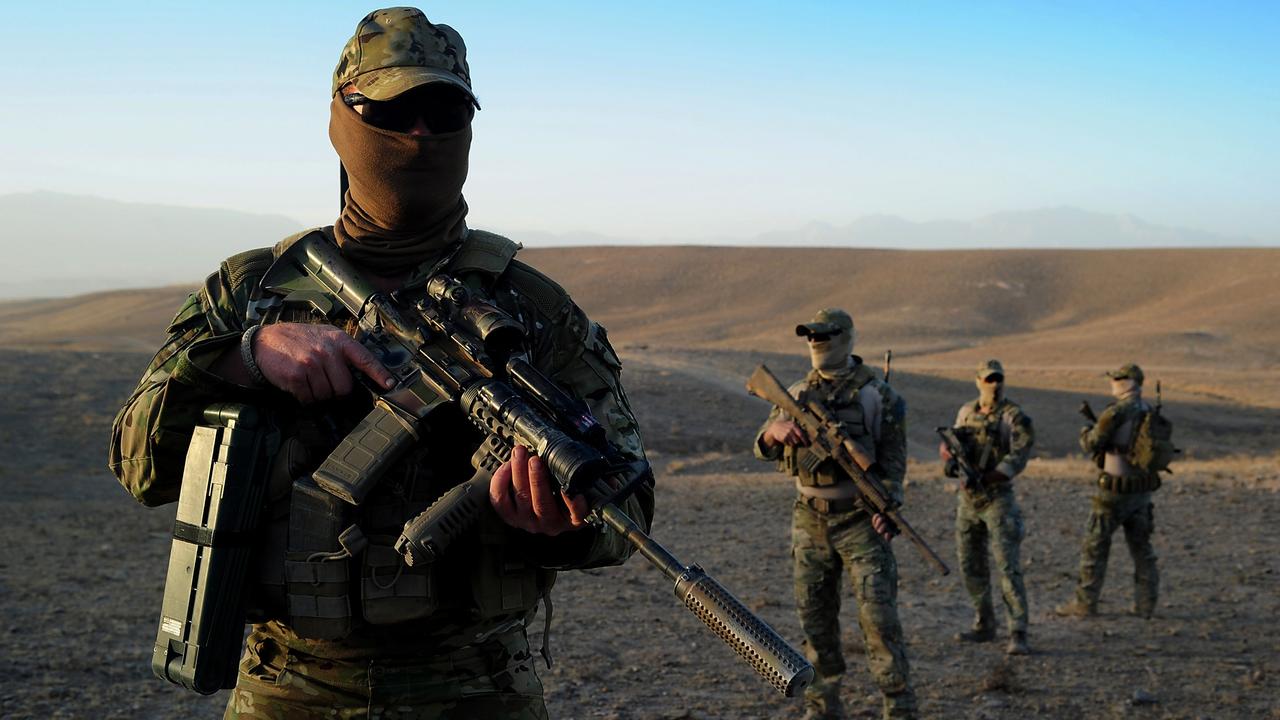
Prof Corn said the Australian report was “tragic” and would spark a response of “sadness” at the highest levels of the Pentagon.
“The Australian Defence Force has a phenomenally positive reputation within the US military,” he said.
“They’re seen as a highly competent and always reliable partner. I don’t think there’s any doubt that that reputation is going to remain intact after this, that it’s not going to be eroded.
“We work with these soldiers. We know how good they are. This is really sad and it’s sad that it happened. And there will be sympathy for the leadership of the institution.
“Of course, it’s sad for the victims. It’s sad for the defendants, the defendants’ families and friends.
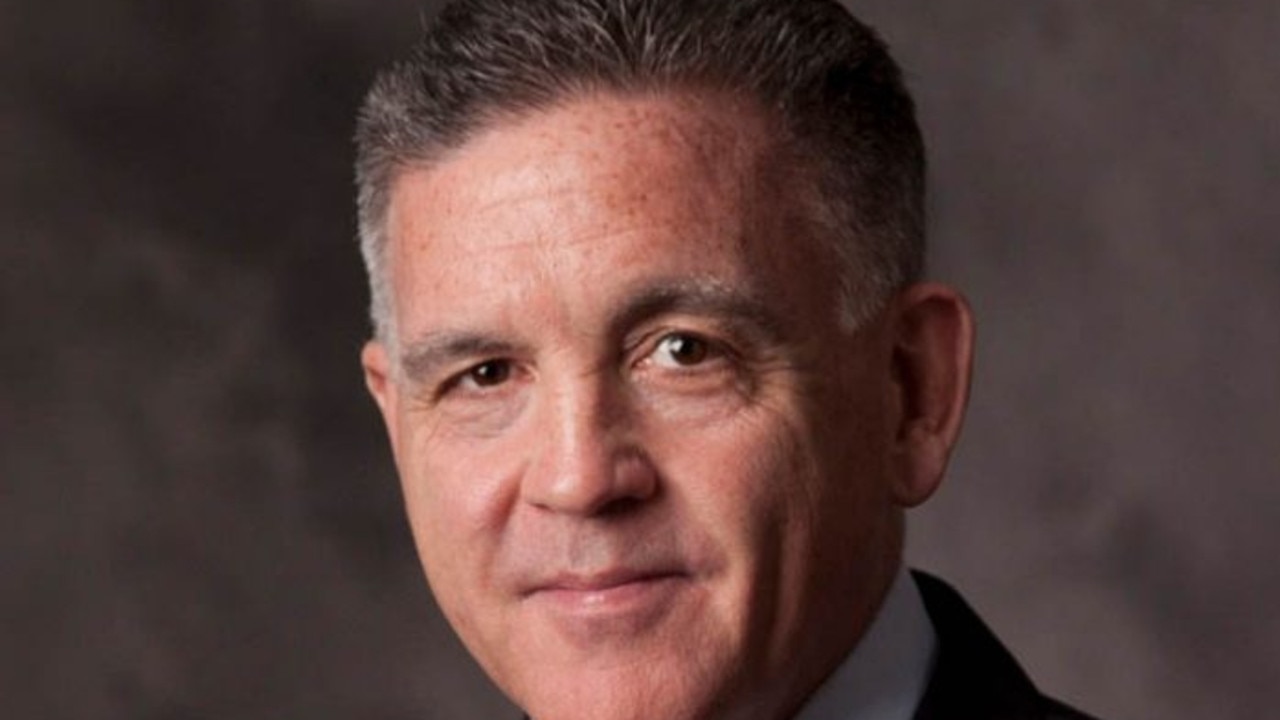
“But it’s also sad because it unfortunately defines the efforts of thousands of Australian soldiers and airmen who have fought and put their lives in jeopardy for the people of Afghanistan over the years, who’ve been a trusted ally with the United States and other coalition partners.
“And they’ve done it right. But for the public, this will be a defining moment.”
Professor Rachel VanLandingham is a retired Air Force Judge Advocate General who was tasked with driving unit-level reform in the wake of the Abu Ghraib prison torture scandal in Iraq during the early 2000s.
She said the initial challenge for Australian commanders would be maintaining morale and instituting the most accountable leadership possible.
War crimes harm not only “innocent victims” but cause “extreme harm to their own unit”.
“They also do harm to the overall mission because adherence to the law is very much linked to mission effectiveness and it’s very much linked to morale and discipline,” she said.
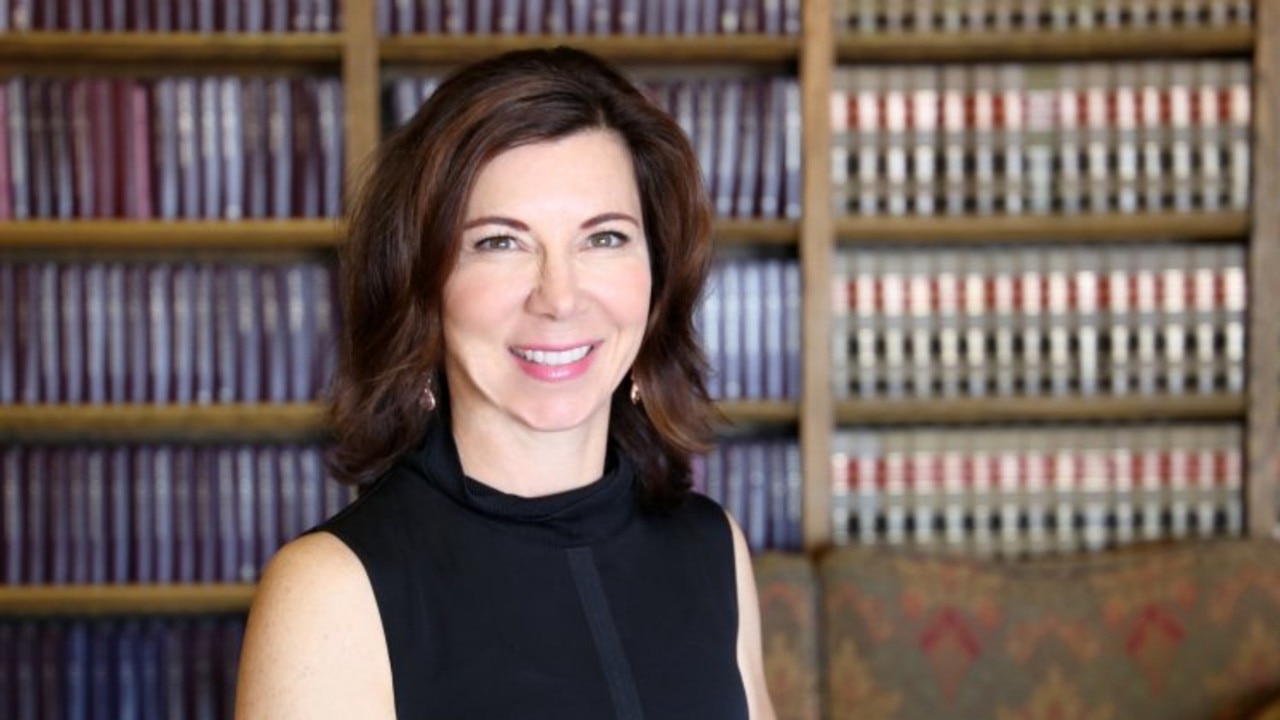
“Because when individuals start to go off the rails and engage in violence outside of the rules without accountability, it makes folks second-guess why they’re adhering to the same rules.”
She said it was hard to compare the Australian allegations to those of Abu Ghraib because they involved civilian contractors in a detention facility but the reforms that came out of the shameful US episode could be instructive.
“There was a tremendous revision regarding the Department of Defence training and the reporting requirements regarding any credible allegation of detainee abuse,” she said.
Professor Corn said Defence Force Chief Angus Campbell’s compelling public apology to Afghans and pledge to seek reform was the ideal approach for a leader.
“It’s a positive that the institution of the defence force was able to conduct a thorough investigation and be transparent about the derelictions and the leadership failures that they uncovered,” Prof Corn said.
“The reality is there’s never been a war that’s been fought by any professional military where there haven’t been deviations from the rules. It’s one of the great challenges of military leadership.
“How do you cultivate a culture that enables men and women to overcome their instinctive human aversion to inflicting violence on another human being? Because we don’t want a military full of sociopaths.
“But at the same time, (how do you) prepare them for the incredibly demanding challenge of drawing lines and retaining the line between legitimate and illegitimate violence and warfare?
“And it’s not a legal question. It’s not a legal responsibility. It’s a leadership responsibility.”
For those needing support:
· The Defence all-hours Support Line is a confidential telephone and online service for ADF members and their families 1800 628 036
Open Arms provides 24-hour free and confidential counselling and support for current and former ADF members and their families 1800 011 046, or through SafeZone on 1800 142 072.
MORE NEWS
PM ‘puzzled’ by Aussie reaction to war hero’s legal backer
Shock war crimes report: What happens next
3000 soldiers could lose medals
Actions of few endangering others
Five words Australia’s military must use right now
War hero’s army squadron disbanded
Originally published as World reacts to Australian war crime inquiry report






